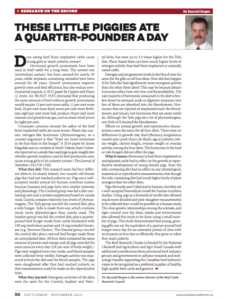These Little Piggies Ate a Quarter Pounder a Day
This article written by Dr. Reynold Bergen, BCRC Science Director, originally appeared in the November 2015 issue of Canadian Cattlemen magazine and is reprinted on the BCRC Blog with permission of the publisher.
Does eating beef from implanted cattle cause young girls to reach puberty sooner?
Hormonal growth promotants have been used in beef cattle for a long time. The newest one (trenbolone acetate) has been around for nearly 35 years, while implants containing estradiol have been around for 60 years. Growth promotants improve growth rates and feed efficiency, but also reduce environmental impacts. A 2012 paper by Capper and Hayes (J. Anim. Sci. 90:3527-3537) estimated that producing the same amount of beef without growth promotants would require 12% more cattle, 11% more feed, 10% more land, 7% more fertilizer, 8% more fuel, produce 10% more manure and greenhouse gas, and increase retail prices by 8%.
Consumer concerns around the safety of the beef from implanted cattle are more recent. Plants also contain estrogen-like hormones (phytoestrogens), so a counter-argument is that ‘there are more hormones in the bun than in the burger’. A 2014 paper by James Magolski and co-workers at North Dakota State University reported on a study that used pigs to gain insight into whether growth implants used in beef production may cause young girls to hit puberty sooner (The Journal of Nutrition 114:1718-1724).
What They Did
This research team fed four different diets to 24 closely-related, two-month-old female pigs that had not reached puberty yet. Pigs are a well-accepted model animal for human nutrition studies because humans and pigs have very similar anatomy and physiology. The Control group was fed a diet containing corn and a protein supplement based on canola meal. Canola contains relatively low levels of phytoestrogens. The Tofu group was fed the control diet, plus a tofu burger. Tofu is made from soy, which contains much more phytoestrogen than canola meal. The Implant group was fed the control diet, plus a quarter-pound beef burger made from cattle implanted with 100 mg trenbolone acetate and 14 mg estradiol benzoate (e.g. Synovex Choice). The Natural group was fed the control diet plus a natural beef burger made from an un-implanted steer. All four diets contained the same amount of protein and energy, and all pigs were fed the same amount every day (3.8% of body weight). Pigs were weighed every two weeks, and blood samples were collected twice weekly. Estrogen activity was measured in both the diet and the blood samples. The pigs were slaughtered after they had reached puberty so that measurements could be made on the reproductive tract.
What They Learned
Estrogenic activities of the diets were the same for the Control, Implant and Natural diets, but were up to 3.5 times higher for the Tofu diet. Plant-based diets can have much higher levels of estrogen activity than beef from implanted or naturally-raised cattle.
Estrogen and progesterone levels in the blood were the same for the gilts on all four diets. How did that happen if the Tofu diet had significantly more estrogenic activity than the other three diets? This may be because dietary hormones often have very low oral bioavailability. The vast majority of hormones consumed in the diet are broken down by stomach acids or digestive enzymes; very few of them are absorbed into the bloodstream. Hormones that are injected or implanted reach the bloodstream and tissues, but hormones that are eaten rarely do. Although the Tofu pigs ate a lot of phytoestrogens, very little of it reached the bloodstream.
Effects on animal growth and reproductive characteristics were the same for all four diets. There were no differences in growth rate, feed efficiency, longissimus muscle area (pork chop), fat depth, age at puberty, uterine weight, uterine length, ovarian weight or ovarian activity among the four diets. The hormones in the beef or tofu burgers did not affect the pigs.
What it Means
Hormones in beef from implanted or unimplanted cattle had no effect on the growth or reproductive development of young female pigs. Even the tofu-containing diet had no effect on any physiological, anatomical or reproductive measurements, even though the tofu-containing diet had much higher levels of plant estrogens than the other diets.
Pigs obviously aren’t identical to humans, but they are a well-accepted biomedical model for human nutrition studies. Using pigs as a biomedical model also allowed much more detailed and post-slaughter measurements to be collected than would be possible in a human study. The close genetic relationships among the animals, and tight control over the diets, intake and environment also allowed this study to be done using a small number of pigs. This study demonstrated that young, growing gilts can eat the equivalent of a quarter-pound beef burger every day for an extended period of time with no impacts on how fast or efficiently they grow or when they reach puberty.
Click here to subscribe to the BCRC Blog and receive email notifications when new content is posted.
The sharing or reprinting of BCRC Blog articles is typically welcome and encouraged, however this article requires permission of the original publisher.
We welcome your questions, comments and suggestions. Contact us directly or generate public discussion by posting your thoughts below.
